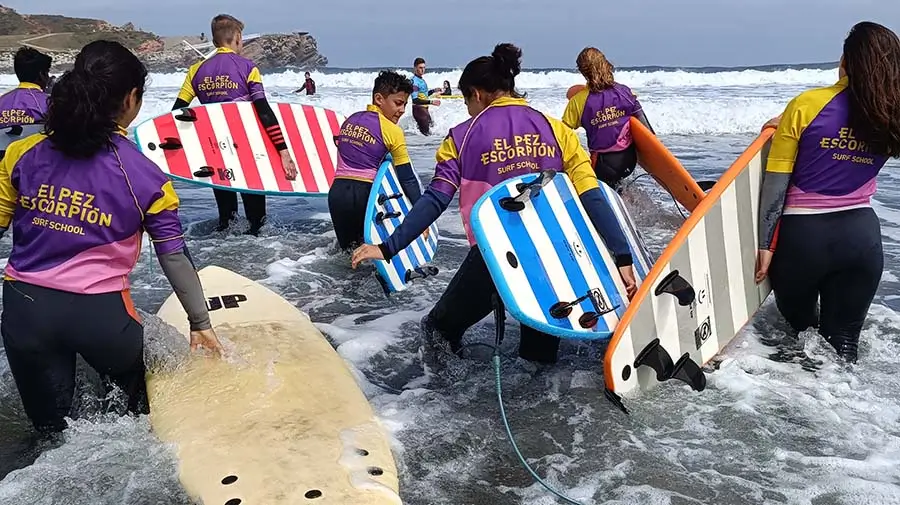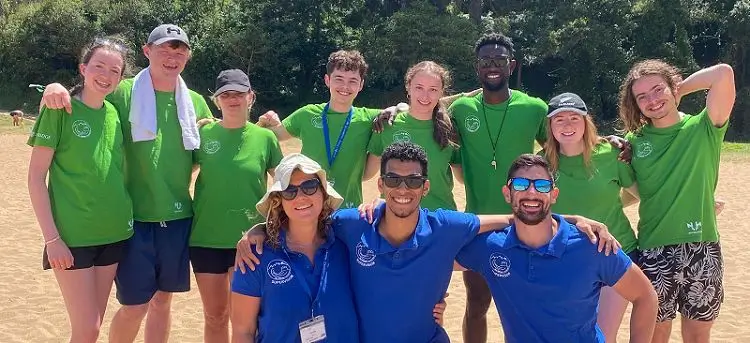When parents think about sending their children to an English camp, one of the first questions that comes up is: what will they do during the day? The answer makes the difference between a program that children experience as an unforgettable adventure and another they perceive as a summer course in disguise.
Activities are much more than entertainment. They are the key for children to learn English naturally, without even realizing it, while they play, practice sports, create projects, or explore nature. That’s why many families choose an international summer camp in Spain, where English becomes part of everyday life instead of a classroom subject.
In this article, we’ll look at what kind of activities make the best English summer camps stand out and how they ensure children return home with unforgettable memories and a much stronger command of English.
Sports activities that motivate and teach English
Sports are one of the most effective tools for children to learn English effortlessly. By following instructions, organizing in teams, or celebrating a victory, the language becomes a natural means of communication. The energy and motivation generated by physical activities make learning much faster and more spontaneous than in a traditional classroom.
Classic sports that never fail
Football, basketball, tennis, or padel are disciplines most children already know and enjoy. Practicing them in English enhances comprehension and fluency since they must use the language to interact with coaches and teammates. The familiarity of sports reduces pressure and makes English flow more naturally.
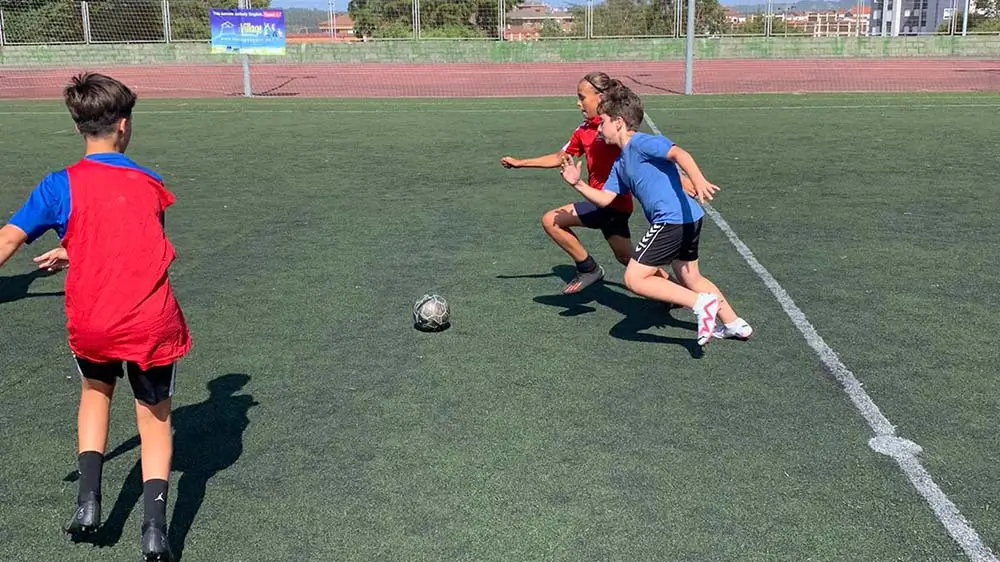
Water sports that spark adrenaline
Summer is the perfect time to try activities like surfing, sailing, or kayaking. These sports, in addition to being exciting, encourage children to learn new vocabulary related to the sea, wind, and water safety. The novelty of the experience strengthens memory and turns every word into an unforgettable moment.
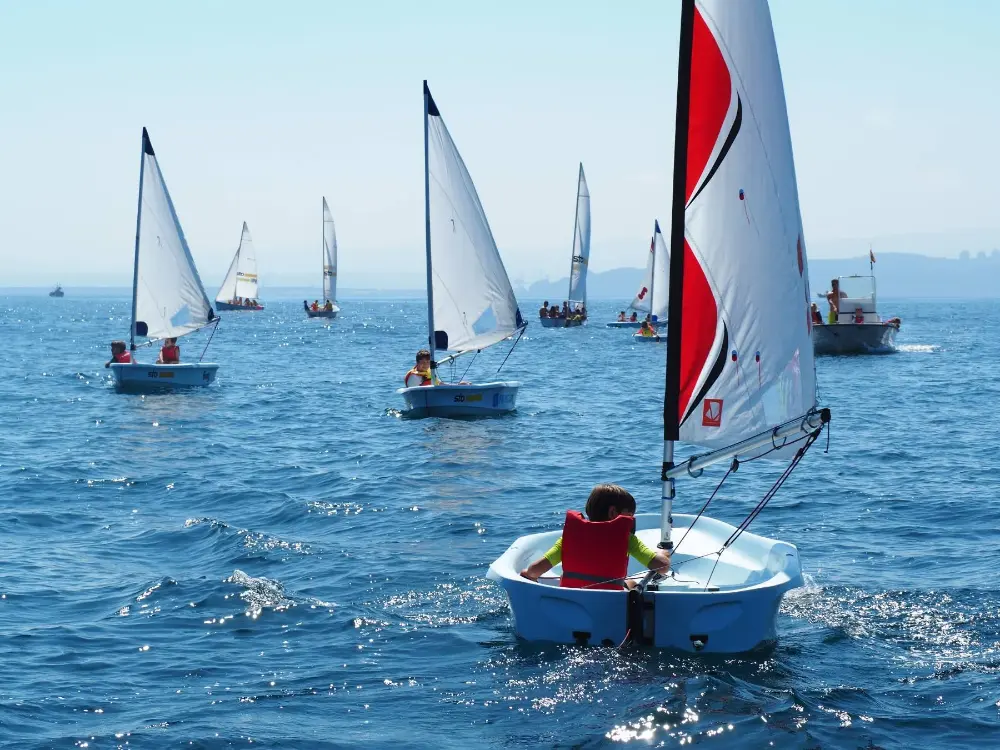
Benefits of learning English through sports
- The language is associated with positive and exciting experiences.
- Children learn useful vocabulary related to their interests.
- Constant team interaction multiplies speaking opportunities.
- Physical effort helps release tension and overcome the fear of making mistakes.
At the Village, sports are an essential part of the program. Participants can choose between sports academies such as the Surf School or Sailing School, as well as football with UEFA- and FIFA-licensed coaches, tennis, padel, and basketball. Everything takes place in English, with international coaches who turn every session into a real immersion experience.
Creative workshops that spark talent and communication
Not all children enjoy sports with the same intensity. That’s why the best English camps offer creative workshops that allow each participant to find a space to express themselves, discover talents, and gain confidence communicating in another language. Creativity is a powerful way to learn English, as it turns vocabulary into something useful and memorable.
Performing arts to boost expression
Theatre, music, and dance are ideal activities to work on pronunciation, intonation, and body expression in English. Rehearsing a script, singing a song, or preparing a show requires using the language in emotional contexts, which aids retention and boosts confidence when speaking.
Media and audiovisual production
Media and communication workshops allow teenagers to create projects in English: writing scripts, recording videos, or editing podcasts. These activities not only reinforce technological and creative vocabulary but also foster teamwork and the ability to communicate ideas in another language.
Cooking as a learning experience
Learning recipes, following instructions, or working as a team in a kitchen are practical experiences that enrich everyday English vocabulary. Moreover, linking learning to the senses — flavors, aromas, textures — strengthens memory and motivation.
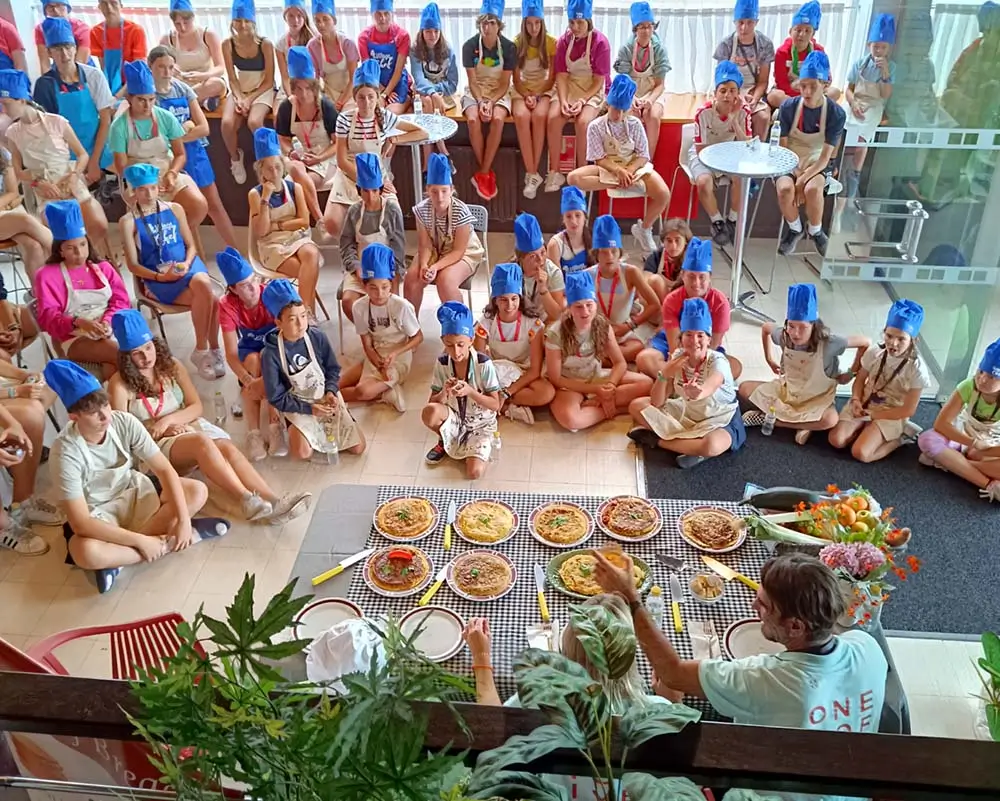
At the Village, creative workshops play a central role. Children and teens can join the Broadway Academy, where they rehearse in English and perform a final show, take part in the Media Academy to produce audiovisual content, or learn recipes and basic techniques at the Chef Academy. Each space turns English into a living language, connected to creativity and fun.
Outdoor excursions and activities that enrich the experience
A good English camp doesn’t limit itself to on-campus activities. Excursions and outdoor life are a unique opportunity for children to interact with the language in real contexts while discovering new environments that broaden their worldview.
Nature as a learning environment
Contact with nature generates enthusiasm and motivates children to participate. Hiking, beach games, or mountain activities help them learn vocabulary related to the environment while enjoying healthy, active experiences.
Culture and heritage as part of the camp
Cultural visits not only provide knowledge but also promote the use of English in different social situations. Asking for directions, following explanations, or discussing what they’ve learned are real opportunities to practice the language outside the classroom.
Impact on motivation and learning
Leaving the campus breaks routine and turns every day into an adventure. These experiences stick in children’s memories and boost their motivation to communicate in English because they associate it with fun, unique moments.
At the Village, excursions are an essential part of the program. Participants explore Asturias through outdoor activities at the beach and in the mountains, hiking routes, and visits to iconic places such as Covadonga, Oviedo, and Gijón. Every trip is conducted in English, with international coaches who turn nature and culture into a classroom without walls.
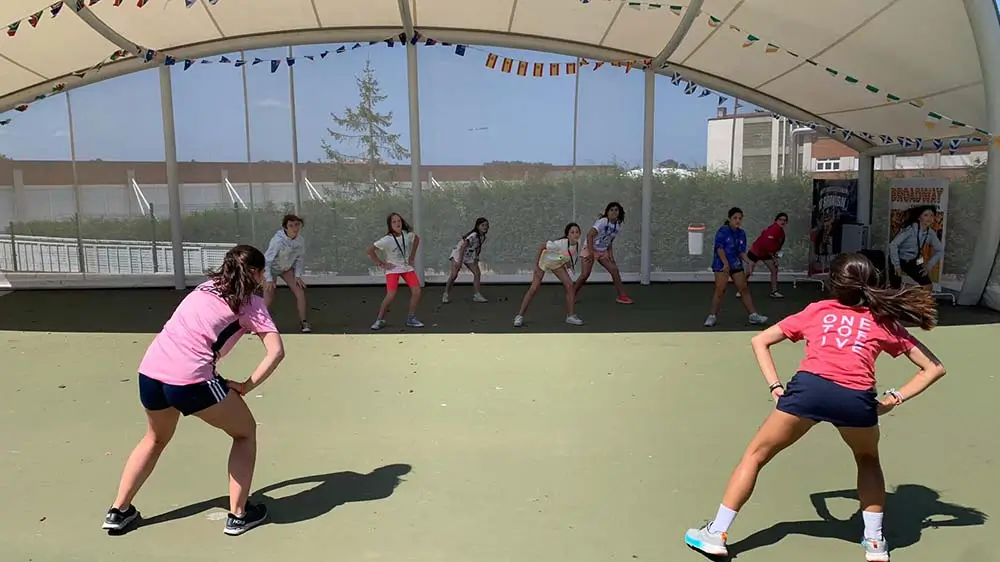
Multicultural coexistence as a daily activity
Beyond sports, workshops, and excursions, there’s an invisible activity that makes all the difference in the best English camps: multicultural coexistence. Sharing rooms, eating together, or simply chatting during free time with children from different countries turns English into the common language and natural communication tool.
In this context, children don’t practice English because someone tells them to — they do it because they need it to integrate and be understood. This multiplies their opportunities to speak, listen, and improve fluency spontaneously. It also opens their minds to new cultures, accents, and ways of seeing the world, enriching their personal development.
At the Village, this coexistence is one of its hallmarks. Every summer, young people from over 12 nationalities and 36 Spanish provinces participate, creating an international environment within Spain. For the children, this means that from the first meal to nighttime activities, English becomes the bridge connecting participants from very different backgrounds.
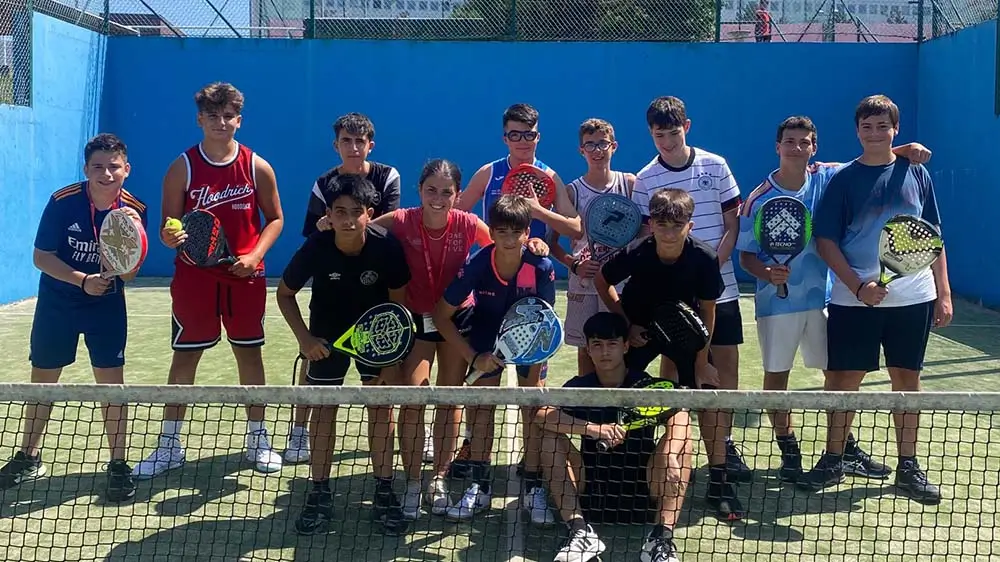
How activities ensure both learning and fun
One of parents’ biggest concerns is that camp will turn into a boring course — or, on the other hand, into a vacation with no learning value. The perfect balance lies in designing activities where children both enjoy themselves and learn at the same time.
In an immersive English camp, every experience is designed for the language to flow naturally. A football match becomes a hands-on vocabulary lesson; a cooking workshop, a chance to learn ingredients and processes; a mountain hike, a scenario to use expressions related to nature. Learning isn’t separate from leisure — it’s part of it.
This model has three key benefits:
- Constant motivation: children are active and having fun, which boosts their interest in English.
- Better retention: by associating the language with exciting experiences, words and expressions stick in memory.
- Growing confidence: the more they use English in real situations, the more confident they become.
At the Village, this approach is applied from start to finish. With more than 200 hours of English in two weeks, sports, creative, and cultural activities, and an international team of coaches, every day is designed for children to live the language while enjoying themselves. There are no classes or exams — only experiences that make learning as natural as playing or sharing life with others.
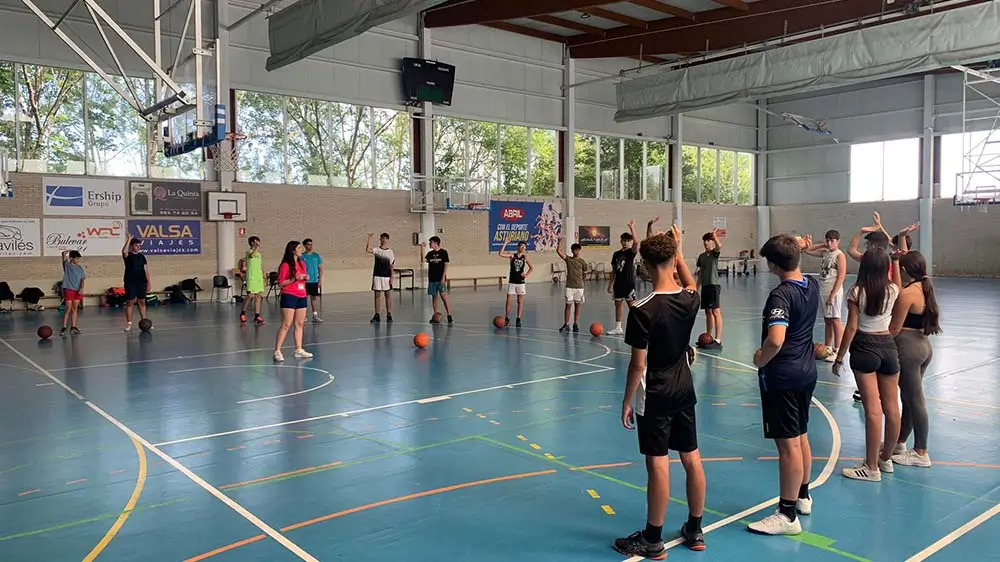
the Village and its unique activity program
What truly sets a quality English camp apart is the variety and level of its activities. At the Village, every child finds a space to grow, have fun, and learn English naturally.
For the youngest participants, the Kids (8–12 years) program offers guided, age-appropriate activities with sports, creative workshops, and excursions in a safe, friendly environment — all designed for them to enjoy their first international experience without leaving Spain.
For teenagers, the Teens (13–17 years) program expands options with high-level sports academies such as football with UEFA- and FIFA-licensed coaches, surfing and sailing on the Asturian coast, or creative workshops like Broadway Academy and Media Academy. It’s an environment that combines independence, multiculturalism, and real English learning.
Living together with young people from over 12 nationalities, guided by international coaches, and following a schedule that blends sports, creativity, and nature makes every day unique. At the Village, children don’t just learn English — they live it.
Activities are much more than a camp’s daily schedule. They’re the moments children remember fondly, the experiences that build their confidence, and the situations where English stops being a subject and becomes part of their lives.
A unique camp isn’t one that just fills children’s time — it’s one that designs each activity so they can learn, have fun, and grow as people. When parents choose a place that combines sports, creativity, nature, and multicultural coexistence, they’re not just giving their children an unforgettable summer — they’re opening the door to new opportunities.
At the Village, every activity is designed to inspire, motivate, and teach. Because learning English doesn’t have to be boring — and experiencing it in a safe, international, and fun environment is the best way to discover it.

